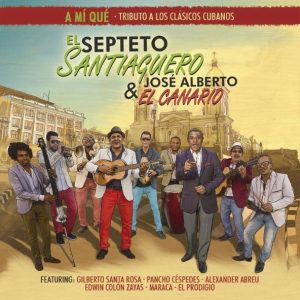This post is also available in:
 Español
Español
El son es lo más sublime, para el alma divertir, se debiera de morir, quien por bueno no lo estime.
In 1929 Ignacio Pineiro wrote and recorded the song “Suavecito” with his Septeto Nacional, which included the above lines, and became a huge hit. With that, he helped to popularize what had been a marginalized genre.
In 2018, there are at least three (3) great traditional “son” recordings worth mentioning.
Septeto Santiaguero with Jose Alberto “El Canario”: “A Mi Que; Tributo a los Clasicos Cubanos”
Back in 2012, this “son” group, which formed in 1995, decided to bring to their recording a group of selected guests. That album, titled “Vamos a la Fiesta” included guests like Ruben Blades, Cheo Feliciano, and Jose Alberto “El Canario” among others.

Since then, “El Canario” has remained in close contact with this traditional “son” group. In 2015, Jose Alberto became a main collaborator and producer of their album “No Quiero Llanto; Tributo a Los Compadres”. Besides Jose Alberto sharing main singing duties, the album has guest artists like Oscar D’Leon, Eliades Ochoa, Andy Montañez, Aymee Nuviola, and Ismael Miranda, among others.
This after three Latin Grammy nominations, this album finally won the award for the septet.
Now, in 2018, the same collaboration with Jose Alberto “El Canario” brings us “A Mi Que”. This album has guests Gilberto Santa Rosa, Maraca, and Alexander Abreu among others.
With the same song selection and music quality as the previous 4 Latin Grammy-nominated albums, this album by the Septeto Santiaguero should easily earn them a 5th nomination and perhaps a second golden phonograph.
Ruben Blades with Roberto Delgado; “Medoro Madera”
The first time Ruben Blades recorded his alter-ego Medoro Madera was in the 1996 recording “La Rosa de los Vientos”. In that album, Ruben used the voice of Medoro in the song “Un Son Para Ti”.
Before that, I heard Ruben use that voice in a concert in the late 80s in a couple of “soneos” jokingly imitating the singing of Pete “El Conde”.
Ruben Blades had mentioned years ago that he was thinking of making an album for Medoro, but not much was done. Until now!
In 2018, we get the great surprise of the release of “Medoro Madera”. The Roberto Delgado orchestra was reduced a to “septeto” type of format to play traditional Cuban “son” in this album. In that regard, the choice of “son” for Medoro Madera was excellent.
The music in “Medoro Madera” is well done. This has been the trademark of the Panamanian bandleader Roberto Delgado in all his recordings with Ruben Blades. The song selection is mostly from the traditional Cuban “son” playbook.
All in all, a great album to listen!
Septeto Acarey: “Enamorate Bailando”

This is the sophomore album by the Peru-based “son” septet which is led by Cuban bassist Reynier Perez. In a wise move, and perhaps borrowing a page from the Septeto Santiaguero, the Septeto Acarey brought in as a guest singer the famed Gilberto Santa Rosa.
With that, the septet founded in 2014, gets a sure hit with the title song “Enamorate Bailando”. This is a love theme performed by the master of singing that kind of songs. Gilberto performs expertly and Acarey backs him up with a deep low chorus that at times seems taken out of a “Charanga”.
The rest of their 2nd album is good. The Acarey singers do a good job of keeping the flavor of the “son” flowing through the album.
The “Son” is Back in 2018
With these releases, I get the impression that the traditional Cuban “son” is back in vogue. Some groups like the Septeto Santiaguero have been at it for some years now.
I don’t want to overlook the fact that the Septeto Nacional of Ignacio Pineiro is still active after more than 90 years. They released a good album in 2010 titled “Sin Rumba No Hay Son”.
So 2018 has served as a reminder for us to enjoy the beautiful Cuban genre, which sounds as delightful in its traditional format as it does in our modernized evolution of it.



[…] The year 1928 began with a lots of hopes for Mataromos. The news spread in Santiago that the RCA Victor company would be doing a promotional tour with their Cuban recording stars, the Sexteto Habanero, which featured singer Abelardo Barroso, one of the best singers of the “son”. […]